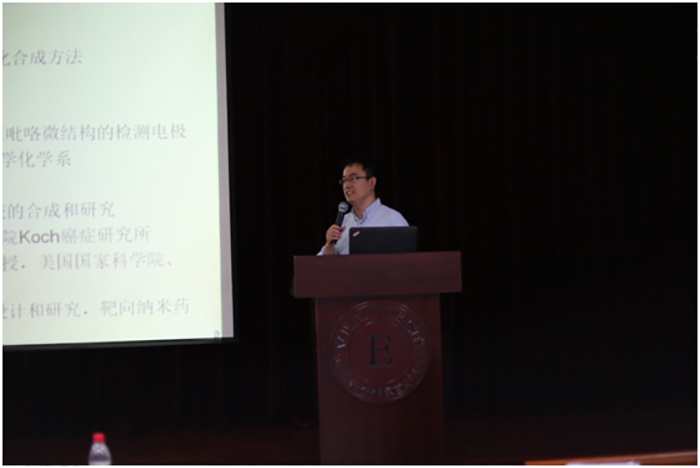The mini-symposium on new strategies and methods in complex molecules Syntheses,
organized by Prof. Guangxin Liang and Prof. Pingping Tang of the State Key
Laboratory of Elemento-organic Chemistry, took place in the Academic Lecture
Hall of the Institute of Elemento-organic Chemistry on May 30th.
This mini academic symposium dates back to 2012 and takes place in May annually
during the time of PhD defenses.
This symposium was hosted by Prof. Zhixiang Yu. Prof. Xisheng Wang, Prof.
Mingming Ma, Prof. Zhenhua Gu and Prof. Hanmin Huang, made wonderful
lectures, and had in-depth discussion with faculties and students of SKLEOC.
In his report titled “transition metal catalyzed radical fluorinations”,
Prof. Xisheng Wang first introduced relevant knowledge about fluorination reactions
and their strategy of resolving the synthesis of organo-fluoro compounds through
transition metal catalysis and free-radical chemistry. Professor Wang then introduced
his research group’s achievements in metal catalyzed radical fluorinations
under mild conditions and metal catalyzed cross coupling reaction involving fluorinated
radicals.

In his report titled “chemistry beyond molecules: from cell membrane fusions
to flexible generators”, Prof. Mingming Ma, based on his years of research
experience, introduced in a progressive manner the ongoing research in his
group. That is, the design and preparation bionic intelligent composites by
adapting the methods of synthetic chemistry and supramolecular chemistry and biomimic
principles. Prof. Ma also introduced the application of such composites in the fields
like new energy, sensors, and biomedicines.
In his report titled “new strategies in the synthesis of atropisomers”,
Professor Zhenhua Gu expounded their novel method to the stereoselective
construction of atropisomers and its application to the asymmetric total
synthesis of rhazinilam family alkaloids.
In his report titled “active metallic intermediate-oriented studies of
catalytic reactions and mechanisms”, Prof. Hanmin Huang first briefed the
audience the challenges in synthetic chemistry from the perspective of the carbon
cycle. Subsequently, Professor Huang illustrated his group’s work on the
synthesis of carboxylic acids, esters, amides, and oxygen/nitrogen containing
heterocycles from alkenes, alkanes and aromatic amines via active metallic
intermediates.
Prof. Yu’s humorous style of hosting and four speakers’ vivid reports aroused
much interest from the audience. The lectures ignited extensive interaction
between the speakers and the audience.